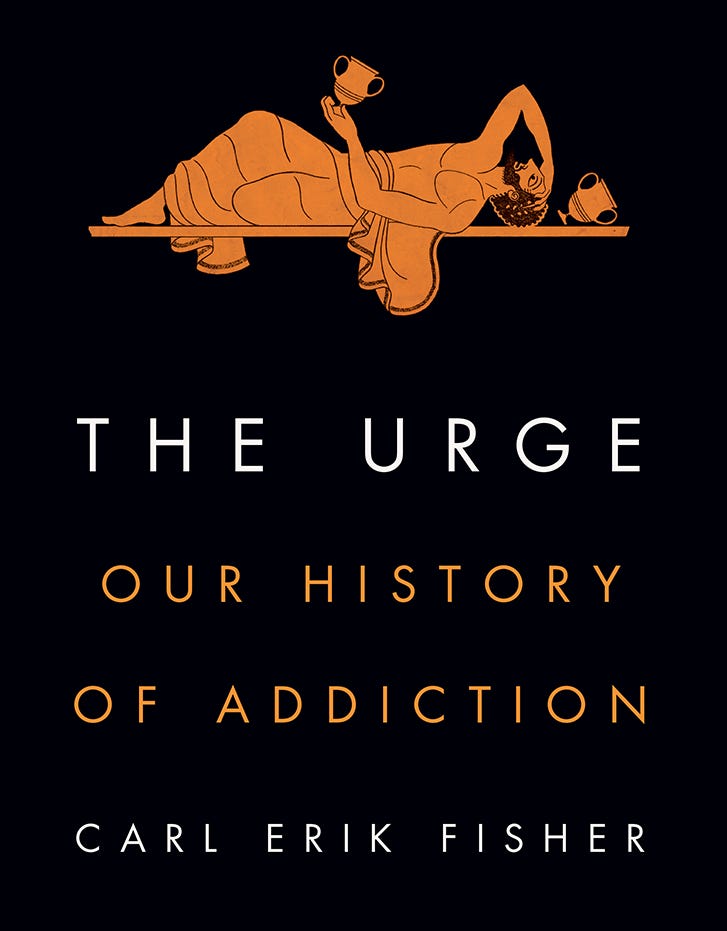INTERVIEW: The Urge: Our History of Addiction with Carl Erik Fisher
Issue 48: A social perspective on addiction and what we can do collectively to overcome it
This week, we are excited to feature an interview with Professor Carl Erik Fisher, whose book, The Urge: Our History of Addiction combines Carl’s clinical experience, research and personal story to offer a new perspective on the history of addiction and how to treat it. One of the most fascinating features of the book is the role that our social groups play in fostering our addictions—or helping us break free of them.
Fisher is an assistant professor of clinical psychiatry at Columbia University, specializing in substance use disorders and other addictive behaviors. He is also the host of the podcast, Flourishing After Addiction, where he explores addiction and recovery by interviewing experts across a variety of subject areas. Jay was a guest on the show a few months ago to talk about The Power of Us and how a purely biological model of addiction is woefully incomplete.
The Urge details the history of addiction through a holistic lens and argues against blaming people who struggle with substance abuse. Carl highlights the influence of religion, public policy, and social problems on how we perceive and treat people who have addictions. To address addiction effectively, we need to consider the broader social context rather than purely focusing on the individual.
In our interview with Carl, he points to the importance of social factors and group dynamics in understanding addiction. He argues that addiction is not an individual problem, and scholars should move beyond focusing solely on medical frameworks for studying addiction.
What does your book teach us about group dynamics?
The history of addiction repeatedly reinforces a the need for community and connection as part of addiction recovery; i.e., it’s not just an individual problem. This interconnected element of addiction is often missed in many discussions that focus on an exclusively medical framework. (I should say that the best clinicians and researchers are able to think across multiple levels; it’s more of a challenge at the level of public discourse.) In turn, the study of recovery has some lovely lessons for the general study of flourishing, because in the end addiction is something that exists in all of us.
What was the most surprising thing you learned as you were writing the book?
Drug epidemics are nothing new. We've been having them for at least 500 years. Of course, we are in the midst of a historic overdose crisis today, but when I set out to study the history of addiction, I was shocked to see that there have been numerous such crises, from tobacco around the time of Christopher Columbus, to drinking during the American Revolution, to multiple American opioid epidemics dating back to the Civil War, and many more. What those epidemics show is that drug problems arise at intersection of multiple intersecting causes—for example, exposure to a new drug or a new formulation of a drug, “addiction supply industries” that promote the drug, and some element of deeper social problems. To respond effectively to drug epidemics, we need to keep all those forces in mind—knee-jerk prohibitionist crackdowns, for example, won’t work.
What is the biggest unanswered question on this topic going forward?
For decades, we've had good addiction research about how to save lives though medical and policy interventions…we’re just not doing them. So to me the biggest question is how to change hearts and mind about the phenomenon of addiction; to escape from polarization and overcome the stigma attached to addiction. I think there’s tremendous promise for crossing those divisions by focusing more on the human-level phenomenon of addiction. This relates nicely to Jay and Dominic’s work. They suggest that polarizations today are more emotional and identity-driven than actually ideological (i.e., based on actual differences in policy preferences). I think this applies to addiction policy. People have strong feelings about addiction recovery and treatment, but what I’ve heard from addiction recovery advocates is that by focusing on the concrete outcomes that matter so much in this field (reducing suffering and saving lives), many people have found ways to connect across seemingly unbridgeable divides.
Do you have any practical advice for people who want to apply these ideas?
We’ll never see the end of addiction, and attempts to conquer, cure, or otherwise control addiction have usually caused much more harm than good. Instead, the key practical pivot is acceptance: to accept and work with and take care of our suffering, rather than trying to manipulate or change it. Both very good psychotherapy research and the historical examples of people struggling with addiction point to the importance of this kind of acceptance.
You can learn more about Dr. Fisher’s book, research, and podcast at his website.
News and updates
Dominic did an interview on the B.E. Good! podcast, hosted by BVA Nudge Consulting. He explains in the podcast that “political polarization is driven in part due to political becoming part of people’s identities, and that cooperation with out-group members may challenge peoples’ identities.”
Catch up on the last one…
And in case you missed our last newsletter about Ukrainian President Zelensky’s leadership, you can read it here.






